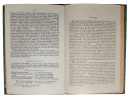-
Type
Book (1619)
Magazine (37)
Music sheets (1)
New book (1)
-
Latest
Last 24h (1)
Last 3 days (21)
Last month (57)
Last week (2)
-
Language
Dutch (4)
English (1)
French (1444)
German (3)
Russian (206)
-
Century
19th (51)
20th (758)
21st (78)
-
Countries
Belgium (83)
Canada (13)
Denmark (43)
France (1225)
Germany (6)
Italy (3)
Netherlands (2)
Switzerland (71)
United Kingdom (2)
United States of America (210)
-
Syndicate
ALAC (11)
CLAM (5)
ILAB (689)
NVVA (17)
SLACES (17)
SLAM (607)
SNCAO (1)
Sa vie, son oeuvre
U.R.S.S, Les éditions du progrès 1978 1 Grand in -8 broché sous couverture illustrée rempliée 723[p.p]
Disponibilité sous réserve de vente en boutique, prix valable frais de port inclus pour commande > 90 € et poids < 1 Kg
Sochineniya. In Russian /Works
Short description: In Russian. Marx, Karl. Works. Moscow: Part Publishing House, 1932-1939. Please feel free to contact us for a detailed description of the copies available. SKU8986845
Svyatoe semeystvo, ili Kritika kriticheskoy kritiki. In Russian /The Holy Fam...
Short description: In Russian. Marx, Karl. The Holy Family, or Criticism of Critical Criticism. Moscow: State Politizdat, 1956. Svyatoe semeystvo, ili Kritika kriticheskoy kritiki. In Russian /The Holy Family or Criticism of Critical Criticism . The image is provided for reference only. It may reflect condition of one of the available copies or only help in identifying the edition. Please feel free to contact us for a detailed description of the copies available. SKU5892034
Teorii pribavochnoy stoimosti. In Russian /Value-added theories
"Short description: In Russian. Marx, Karl. Value-added theories. Moscow; Leningrad: Sotsakgiz, 1931. The image is provided for reference only. It may reflect condition of one of the available copies or only help in identifying the edition. Please feel free to contact us for a detailed description of the copies available. SKU8987335"
Teorii pribavochnoy stoimosti. In Russian /Value-added theories
Short description: In Russian. Marx, Karl. Value-added theories. Moscow: Partizdat, 1932-. Please feel free to contact us for a detailed description of the copies available. SKU8987333
Teorii pribavochnoy tsennosti. In Russian /Value-added theories
Short description: In Russian. Marx, Karl. The Theories of Supplementary Value. Petrograd: Comment ounce, 1922-1923. The image is provided for reference only. It may reflect condition of one of the available copies or only help in identifying the edition. Please feel free to contact us for a detailed description of the copies available. SKU8964521
Textes
Éditions sociales Broché 1966 In-12 (11,6 x 17,6 cm), broché, 522 pages ; pliures au dos, mors frottés, deux coins cornés, quelques petites traces sur les plats, par ailleurs assez bon état général. Livraison a domicile (La Poste) ou en Mondial Relay sur simple demande.
Textes (1842-1847)
Spartacus. 1970. In-12. Broché. Bon état, Couv. convenable, Dos satisfaisant, Intérieur frais. 126 pages.. . . . Classification Dewey : 320-Science politique
Avril - Mai 1970 2ème série N°33 Classification Dewey : 320-Science politique
Textes (1842-1847)
Spartacus - René Lefeuvre 13 x 18,5 Paris 1970 Broché, 126 p. "Spartacus, cahiers mensuels" - avril-mai 1970 - 2ème série n°33. Sommaire: Remarques sur la récente règlementation de la censure prussienne / Lettres à Ruge / Contribution à la critique de la philosophie du droit de Hegel / Gloses marginales critiques à l'article "le roi de Prusse et la réforme sociale" / La critique moralisante et la morale critique. Les éditions des « Cahiers de Spartacus » ont été fondées en 1934 par le militant René Lefeuvre (1902-1988), dont l'objectif était de développer la culture révolutionnaire et l'action de masse, Dos, intérieur et couverture en très bon état. Bon exemplaire.(C137)
Textes (1842-1847) - Cahiers mensuels Spartacus Avril mai 1970 2e série - n°33 - Remarques sur la récente règlementation de la censure prussienne - Lettres à Ruge - Contribution à la critique de la philosophie du droit de Hegel - Gloses marginales critiq
Spartacus. 1969. In-8. Broché. Etat d'usage, Couv. légèrement passée, Dos satisfaisant, Intérieur frais. 127 pages.. . . . Classification Dewey : 947-Europe de l'Est, URSS
"Sommaire : Remarques sur la récente règlementation de la censure prussienne - Lettres à Ruge - Contribution à la critique de la philosophie du droit de Hegel - Gloses marginales critiques à l'article ""le roi de Prusse et la réforme sociale"" - La critique moralisante et la morale critique Classification Dewey : 947-Europe de l'Est, URSS"
Textes choisis et annotés par Jean Kanapa - Tome I : Le "Manifeste du parti communiste" - Philosophie et méthode - Histoire sur le colonialisme - Tome II : Economie - De l'homme aliéné à la société communiste - La lutte des classes -
Paris : Editions sociales (Collection "Classiques du marxisme"), 1972 - deux volumes 11x17,5cm brochés de 259 et 276 pages - bon état -
Tous nos livres sont visibles sur notre site : https://www.livrepoesie.com/
"Textes I et II, collection ""classiques du marxisme"""
editions sociales. 1972. In-12. Broché. Etat d'usage, Couv. convenable, Dos satisfaisant, Quelques rousseurs. 256+276 pages. Rousseurs sur les tranches.. . . . Classification Dewey : 320-Science politique
Classification Dewey : 320-Science politique
Textes II : Economie, De l'homme aliéné à la société communiste (individu et société), La lutte des classes. Collection : Classiques du marxisme.
Paris, Editions Sociales, 1972. 11 x 18, 278 pp., broché, très bon état.
TEXTES - TOME I - LE MANIFESTE DU PARTI COMMUNISTE - PHILOSOPHIE ET METHODE HISTOIRE SUR LA COLONIALISME - COLLECTION CLASSIQUES DU MARXISME
EDITIONS SOCIALES. 1972. In-12. Broché. Etat d'usage, Couv. légèrement pliée, Dos satisfaisant, Intérieur frais. 259 Pages. . . . Classification Dewey : 320-Science politique
Classification Dewey : 320-Science politique
Texte zu Methode und Praxis, 1.
Rowohlt. 1966. In-12. Broché. Bon état, Couv. convenable, Dos frotté, Intérieur frais. 259 pages.. . . . Classification Dewey : 430-Langues germaniques. Allemand
"Jungendschriften 1835-1841. Mit einem Essay ""Zum Verständnis der Texte"". Erläuterungen und Bibliographie herausgegeben von Günther Hillmann. Classification Dewey : 430-Langues germaniques. Allemand"
"Texte zu Methode und Praxis III - Der Mensch in Arbeit und Kooperation (Aus den Grundrissen der Kritik der politischen ökonomie, 1857/58) - ""Klassiker Rowohlts"" n°218/219 - Philosophie der Neuzeit band 11"
Rowohlt. 1967. In-12. Broché. Etat d'usage, Couv. légèrement passée, Dos satisfaisant, Papier jauni. 250 pages. Quelques rousseurs et traces de mouillures sans conséquences sur le texte. Livre en allemand.. . . . Classification Dewey : 430-Langues germaniques. Allemand
Classification Dewey : 430-Langues germaniques. Allemand
"Texte zu Methode und Praxis II - Pariser Manuskripe 1844 - ""Klassiker Rowohlts"" n°209/210 - Philosophie der Neuzeit band 9"
Rowohlt. 1966. In-12. Broché. Etat d'usage, Couv. convenable, Dos satisfaisant, Intérieur acceptable. 257 pages. Livre en allemand.. . . . Classification Dewey : 430-Langues germaniques. Allemand
Classification Dewey : 430-Langues germaniques. Allemand
TEXTE ZU METHODE UND PRAXIS, II, PARISER MANUSKRIPTE 1844
Rowohlt. 1966. In-12. Broché. Etat d'usage, Couv. légèrement passée, Dos satisfaisant, Intérieur acceptable. 257 pages. 1er plat partiellement insolé. Tranche passée.. . . . Classification Dewey : 430-Langues germaniques. Allemand
Ro Ro Ro, 209-210. Rowohlts Klassiker der Literatur und der Wissenschaft, Philosophie der Neuzeit, Band 9. Herausg. von Ernesto Grassi unter Mitarbeit von Walter Hess. Mit einem Essay 'Zum Verständnis der Texte', Erläuterungen und Bibliographie herausg. von Günther Hillmann. Classification Dewey : 430-Langues germaniques. Allemand
"Texte zu Methode und Praxis I - Jugendschriften 1835-1841 - ""Klassiker Rowohlts"" n°194/195 - Philosophie der Neuzeit band 7"
Rowohlt. 1966. In-12. Broché. Etat d'usage, Couv. convenable, Dos satisfaisant, Papier jauni. 259 pages. Livre en allemand.. . . . Classification Dewey : 430-Langues germaniques. Allemand
Classification Dewey : 430-Langues germaniques. Allemand
The Archive of K. Marx and F. Engels. Book 2. In Russian (ask us if in doubt)/Ar
The Archive of K. Marx and F. Engels. Book 2. In Russian (ask us if in doubt)/Arkhiv K. Marksa i F. Engelsa. Kniga 2. Edited by D. Ryazanov. State Publishing House. 1925. We have thousands of titles and often several copies of each title may be available. Please feel free to contact us for a detailed description of the copies available. SKUalb7a913b5c56fd2367
The Civil War in France. Address of the General Council of the International Working-Men's Association. - [MARX' SEMINAL DEFENSE OF THE PARIS COMMUNE]
High Holborn, for the Council by Edward Truelove, 1871. Small 8vo. Near contemporary quarter cloth with silver lettering to front board. Binding with signs of use, but overall good. One closed marginal tear and title-page with a few brownspots, otherwise very nice and clean. 35 pp.
Exceedingly rare first edition (with the names of Lucraft and Odger still present under ""The General Council"") of one of Marx' most important works, his seminal defense of the Paris Commune and exposition of the struggle of the Communards, written for all proletarians of the world. While living in London, Marx had joined the International Working Men's Association in 1864 - ""a society founded largely by members of Britain's growing trade unions and designed to foster international working class solidarity and mutual assistance. Marx accepted the International's invitation to represent Germany and became the most active member of its governing General Council, which met every Tuesday evening, first at 18 Greek Street in Soho and later in Holborn. In this role, Marx had his first sustained contact with the British working class and wrote some of his most memorable works, notably ""The Civil War in France"". A polemical response to the destruction of the Paris Commune by the French government in 1871, it brought Marx notoriety in London as 'the red terror doctor', a reputation that helped ensure the rejection of his application for British citizenship several years later. Despite his considerable influence within the International, it was never ideologically homogenous... (homas C. Jones: ""Karl Marx' London"").The work was highly controversial, but extremely influential. Even though most of the Council members of the International sanctioned the Address, it caused a rift internally, and some of the English members of the General Council were enraged to be seen to endorse it. Thus, for the second printing of the work, the names of Lucraft and Odger, who had now withdrawn from the Council, were removed from the list of members of ""The General Council"" at the end of the pamphlet. ""[Marx] defended the Commune in a bitterly eloquent pamphlet, ""The Civil War in France"", whose immediate effect was further to identify the International with the Commune, by then in such wide disrepute that some of the English members of the General Council refused to endorse it."" (Saul K. Padover, preface to Vol. II of the Karl Marx Library, pp. XLVII-XLVIII).""Written by Karl Marx as an address to the General Council of the International, with the aim of distributing to workers of all countries a clear understanding of the character and world-wide significance of the heroic struggle of the Communards and their historical experience to learn from. The book was widely circulated by 1872 it was translated into several languages and published throughout Europe and the United States."" (The Karl Marx Archive)Marx concluded ""The Civil War in France"" with these impassioned words, which were to resound with workers all over the world: ""Working men's Paris, with its Commune, will be forever celebrated as the glorious harbinger of a new society. Its martyrs are enshrined in the great heart of the working class. Its exterminators history has already nailed to that eternal pillory from which all the prayers of their priests will not avail to redeem them.""The address, which was delivered on May 30, 1871, two days after the defeat of the Paris Commune, was to have an astounding effect on working men all over the world and on the organization of power of the proletarians. It appeared in three editions in 1871, was almost immediately translated into numerous languages and is now considered one of the most important works that Marx ever wrote. "" ""The Civil War in France"", one of Marx's most important works, was written as an address by the General Council of the International to all Association members in Europe and the United States.From the earliest days of the Paris Commune Marx made a point of collecting and studying all available information about its activities. He made clippings from all available French, English and German newspapers of the time. Newspapers from Paris reached London with great difficulty. Marx had at his disposal only individual issues of Paris newspapers that supported the Commune. He had to use English and French bourgeois newspapers published in London, including ones of Bonapartist leanings, but succeeded in giving an objective picture of the developments in Paris. ...Marx also drew valuable information from the letters of active participants and prominent figures of the Paris Commune, such as Leo Frankel, Eugene Varlin, Auguste Serraillier, Yelisaveta Tornanovskaya, as well as from the letters of Paul Lafargue, Pyotr Lavrov and others.Originally he intended to write an address to the workers of Paris, as he declared at the meeting of the General Council on March 28, 1871. His motion was unanimously approved. The further developments in Paris led him, however, to the conclusion that an appeal should be addressed to proletarians of the world. At the General Council meeting on April 18, Marx suggested to issue ""an address to the International generally about the general tendency of the struggle."" Marx was entrusted with drafting the address. He started his work after April 18 and continued throughout May. Originally he wrote the First and Second drafts of ""The Civil War in France"" as preparatory variants for the work, and then set about making up the final text of the address.He did most of the work on the First and Second drafts and the final version roughly between May 6 and 30. On May 30, 1871, two days after the last barricade had fallen in Paris, the General Council unanimously approved the text of ""The Civil War in France"", which Marx had read out.""The Civil War in France"" was first published in London on about June 13, 1871 in English, as a pamphlet of 35 pages in 1,000 copies. Since the first edition quickly sold out, the second English edition of 2,000 copies was published at a lower price, for sale to workers. In this edition [i.e., MECW], Marx corrected some of the misprints occurring in the first edition, and the section ""Notes"" was supplemented with another document. Changes were made in the list of General Council members who signed the Address: the names of Lucraft and Odger were deleted, as they had expressed disagreement with the Address in the bourgeois press and had withdrawn from the General Council, and the names of the new members of the General Council were added. In August 1871, the third English edition of ""The Civil War in France"" came out, in which Marx eliminated the inaccuracies of the previous editions.In 1871-72, ""The Civil War"" in France was translated into French, German, Russian, Italian, Spanish, Dutch, Flemish, Serbo-Croat, Danish and Polish, and published in the periodical press and as separate pamphlets in various European countries and the USA. It was repeatedly published in subsequent years....In 1891, when preparing a jubilee German edition of ""The Civil War in France"" to mark the 20th anniversary of the Paris Commune, Engels once again edited the text of his translation. He also wrote an introduction to this edition, emphasising the historical significance of the experience of the Paris Commune, and its theoretical generalisation by Marx in ""The Civil War in France"", and also giving additional information on the activities of the Communards from among the Blanquists and Proudhonists. Engels included in this edition the First and Second addresses of the General Council of the International Working Men's Association on the Franco-Prussian war, which were published in subsequent editions in different languages also together with ""The Civil War France"". (Notes on the Publication of ""The Civil War in France"" from MECW Volume 22). Only very few copies of the book from 1871 on OCLC are not explicitly stated to be 2nd or 3rd editions, and we have not been able to find a single copy for sale at auctions within the last 50 years.
THE CLASS STRUGGLES IN FRANCE (1848-1850)
New York, international publishers, Marxist library, vol XXIV, 1935, in-8 hardcover, no dj, 159pp. Errata. Rares annotations in the margin (1 or 2 with red pen), otherwise very good condition.
Nombreux titres disponibles en Philosophie.
The K.Marx and F.Engels Institute of the Central Executive Committee of the USS
The K.Marx and F.Engels Institute of the Central Executive Committee of the USSR. In Russian /Institut K.Marksa i F.Engelsa pri TsIK SSSR. Moscow-Leningrad State Publishing House 1930. 104 p. We have thousands of titles and often several copies of each title may be available. Please feel free to contact us for a detailed description of the copies available. SKUalb408894dffe97d53d.
TRAVAIL SALAIRE ET CAPITAL - COLLECTION CLASSIQUES DU MARXISME
EDITIONS SOCIALES. 1975. In-12. Broché. Etat d'usage, Couv. légèrement passée, Dos satisfaisant, Intérieur frais. 91 Pages - 1er plat tâché. . . . Classification Dewey : 330-Economie
Classification Dewey : 330-Economie
Travail, salaire et capital. Suivi de Salaire, prix et profit.
P., Editions Sociales, 1960, 1 vol. in-8 (226 x 143) broché sous couverture imprimée en gris et vert, de 126 pp. Papier jauni, très bel exemplaire partiellement non coupé.
Fait partie des "Oeuvres complètes de Karl Marx" aux Editions Sociales.
 Write to the booksellers
Write to the booksellers























